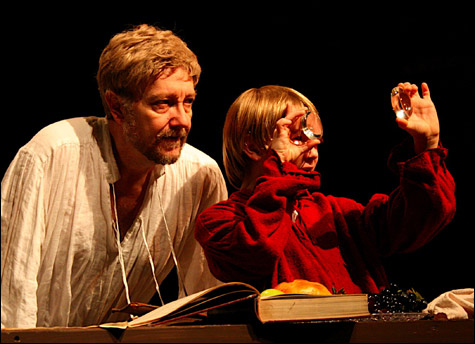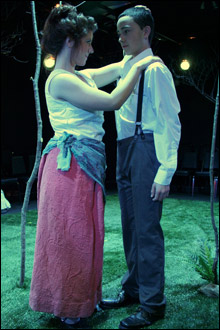
THE LIFE OF GALILEO: Richard McElvain (here with Andrew Cekala) is an energetic, multi-faceted, even mischievous and epicurean Galileo. |
Lest you think The Life of Galileo is all about the struggle between intelligent inquiry and a 17th-century Church with its head up its vestments, the noise of a nuclear explosion rumbles through a scene late in the Underground Railway Theater production (at Central Square Theater through May 17), wherein the title genius talks about the social responsibility of science. Having fled the Nazis in 1933, Bertolt Brecht wrote the play six or seven years before Hiroshima (though he later revised it). But it's clear the famed dramatist had more than history on his mind when he set out to tell the tale of the man who insisted, until faced with the rack, that the sun and not the Earth was the linchpin of the cosmos.
Veteran director David Wheeler is at the helm of the rich if minimally accoutered staging by URT in its role as partner in the Catalyst Collaborative @ MIT. There is an element of bare-bones pageantry in Brecht's play — which, the dramatist being a Marxist, has as much to say about knowledge and the marketplace as it does about the father of modern science's impassioned head butt to the opiate of the people. Capitalizing on URT's strengths, Wheeler translates this into masked, commedia-style clowning that includes a cleverly rhymed introduction and an Italian carnival (the purpose of which is to show a rowdy rank-and-file loosening its ties to Church doctrine) that boasts a sun-like Galileo's-head puppet supplied with drapery arms and a giant pencil with which to scribble across the Scriptures.

The episodic action, which begins in 1609 in Padua and concludes in 1637 with Galileo under house arrest and bitter self-indictment, unfolds on a scaffolding-bedecked runway that set designer David Fichter has flanked with impressive murals of classical and modern icons — not to mention Heaven and Earth, blowing apart. On the other hand, the period clothes are pretty rag-tag and worn over modern slacks and shoes. Richard N. Goodwin's Two Men of Florence, a treatment of the same smackdown recently given its world premiere by the Huntington Theatre Company, may have been gaseous and pretentious, but at least the costumes had bottom halves.
URT utilizes a sharply eloquent translation by British playwright David Hare that pinpoints but is not weighed down by Brecht's didacticism. Richard McElvain, though his light is too long hidden under the bushel of a bad blond wig, renders an energetic, multi-faceted, even mischievous and epicurean Galileo. The production suffers from some amateurism around the edges, most of it supplied by players attempting to distinguish among multiple roles with old-age tricks. But there is strong support by Lewis D. Wheeler as the fiery young student first inspired by Galileo and then roused to harsh condemnation of his mentor's sell-out, and Stephen Russell as the subtly sinister Cardinal Bellarmine. Two child actors, Andrew Cekala and Tim Traversey, have been coached to a pleasing naturalism. And Ramon Castillo contributes the mysterious music of two spheres vying to be the center of Man's universe.

SPRING AWAKENING: The play is somewhat lumbering and sloppily constructed, but the teen actors prove adept. |
Frank Wedekind dipped into Pandora's box years before penning the famed Lulu plays that made a screen legend of Louise Brooks. Peek into the German playwright's first work — the 1891 Spring Awakening, inspiration for the Tony-winning rock musical — and you find not just surrealism and teen spirit but sado-masochism, rape, abortion, homo-eroticism, and an on-stage circle jerk. It's no wonder the thing wasn't put on uncensored for 75 years! Times have changed, and in the wake of the success of the musical, Zeitgeist Stage Company is producing the original (at the BCA Plaza through May 9), with an age-appropriate cast as the gaggle of hormonal 14-year-olds in a repressed German hamlet.Artistic director David J. Miller is at the helm of the feverish production, which uses his adaptation of a new translation by Reinhold A. Mahler that veers between colloquialism spiced by profanity and a formalism that's particularly jarring in the scene in which three night-shirted youths try to keep themselves from whacking off to female nudes. Miller also designed the sylvan, BCA-basement-defying glade of a set, complete with verdant Astroturf and trees on the verge of bud, for this 19th-century precursor to Splendor in the Grass.
The 27-year-old playwright is obviously on the side of the kids, most of whom are under tremendous academic pressure, kept ridiculously in the dark about sex, and regarded as suspicious loiterers at the crossroads of degeneracy and "the moral order." With the exception of a couple of mothers, the adults — with names like Professor Tonguetwister and Reverend Baldbelly — are stammering, oppressive cartoons whom Miller portrays as less mature and more quarrelsome than the kids. A meeting of a quartet of begowned professors gathered to expel a student deteriorates into a melee amid which the only civil presence in the room is the teenage Melchior, who's about to be axed from academe for providing written, graphically illustrated sex education for his more agitated chum Moritz, who was driven to suicide — though probably not by the sex tips.